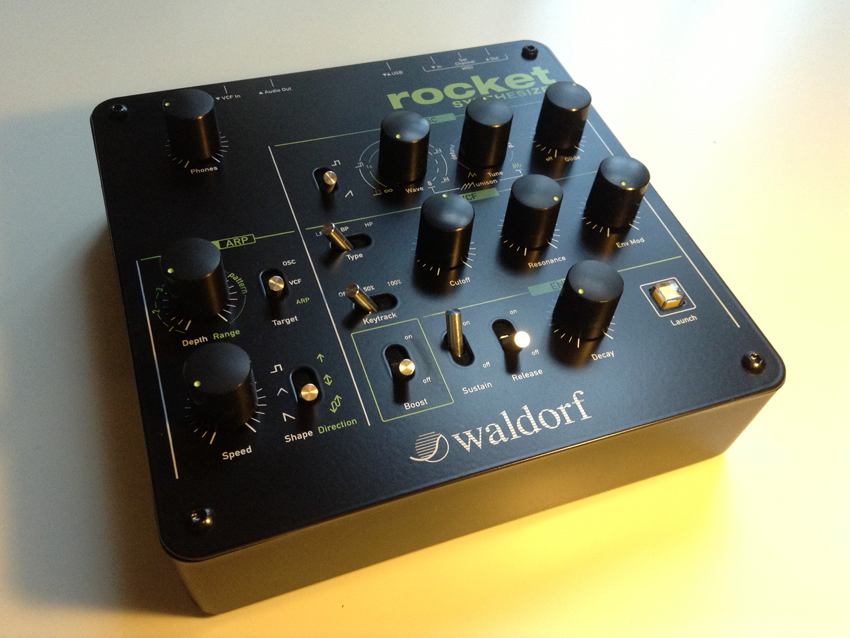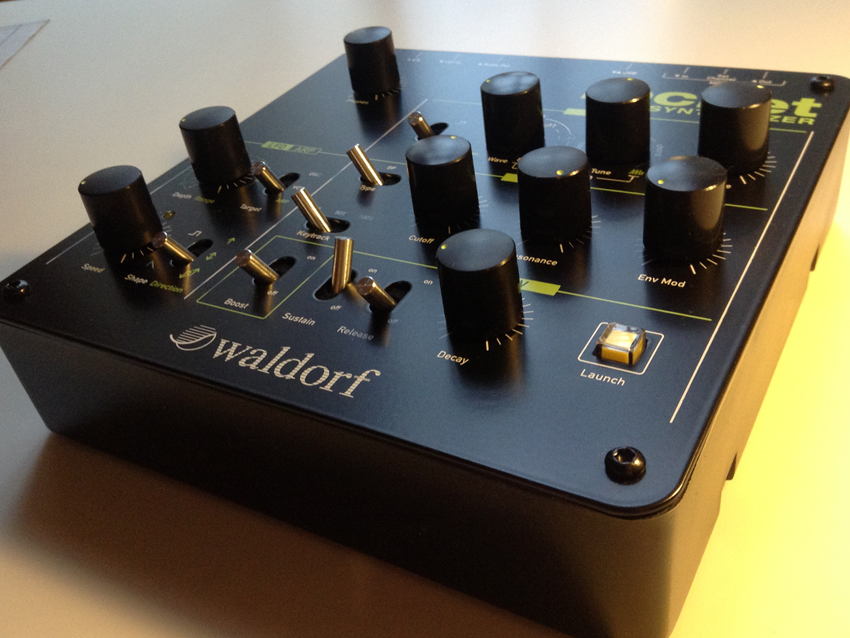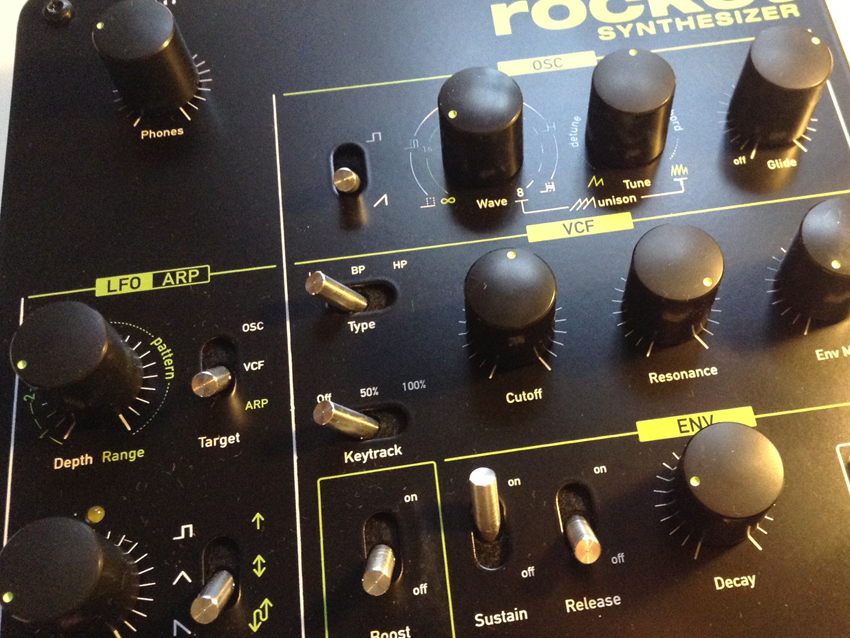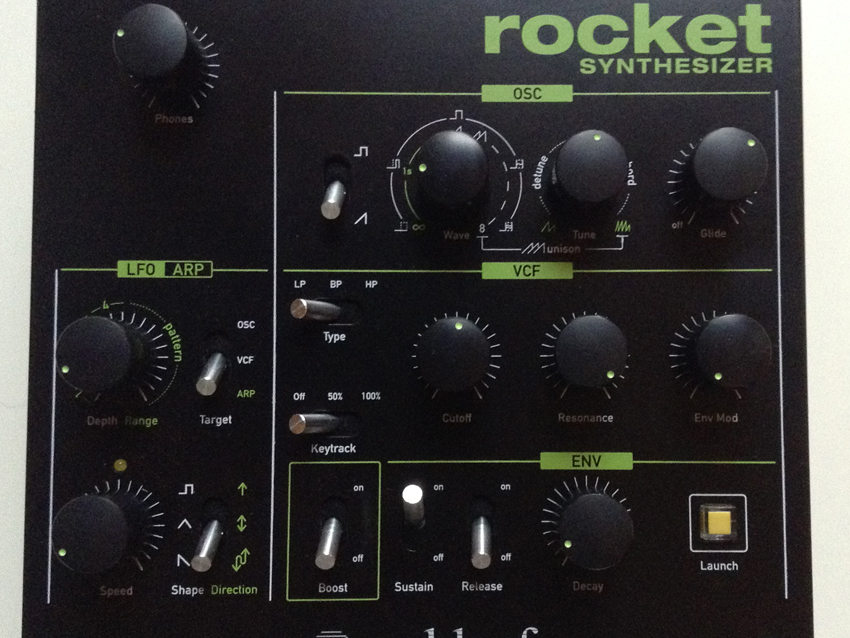
Hands-on with the Waldorf Rocket
Rocket is targeted at the nascent budget analogue monosynth market that's appeared over the past year or so, and has thus far brought us such delights as Arturia’s MiniBrute and Korg’s monotribe.
Pitched in scale between Arturia and Korg’s efforts, Rocket is a single oscillator synth in a pint-sized package with a few tricks up its sleeve, and of course that all-important analogue filter. From the complexity of the oscillator we can only assume that it's digital, because it offers an array of sound generation tricks including 8 voice unison detune, chord mode and hard sync.
Unlike its rivals Rocket doesn't have a keyboard to speak of at all, and requires MIDI input via the USB or good old-fashioned MIDI in. The USB is just for MIDI, so you’ll need to plug the synths 1/4 mono jackpot into an audio interface or mixer, though the synth does have a mini jack headphone slot too. The unit can be powered by USB from your laptop, and also comes with a power supply that’s necessary if you intend to use it via the MIDI in.
Despite its dependence on having an external MIDI input Rocket is extremely portable. Its dimensions are less than 10 by 10-inches, and it’s incredibly light weighing - only a little more than a tablet. Not quite small enough to be a pocket Rocket, but its diminutive stature means that Waldorf are surely aiming for gigging musicians as well as computer-based producers after a taste of analogue authenticity.

Design
On first impressions its hard to believe that Rocket could be anything other than a toy - it's really tiny even considering it’s a hybrid digital/analogue synth, and the interface isn't exactly cluttered with controls.
However, the build quality is reassuringly excellent, which is surprising considering the unit’s low price and its light weight. The knobs have decent build quality and rotate smoothly, and the switches are satisfyingly chunky. Overall the form is a delight, and the included Quickstart instruction card is refreshingly unfussy - you just plug in USB or MIDI input, connect the mono audio out and you’re ready to roll!
Once you’re up and running it’s time to experiment, starting with the synths oscillator. Despite only having three knobs and a pulse/sawtooth switch, this isn't as straightforward as you might imagine. The Wave and Tune knobs give access to a huge range of different sounds including the unison detune, chords and hard sync we already mentioned, and - while reading the downloadable manual is advisable to get the most from it - it's certainly possible to get some fantastic sounds out of it without really fully understanding what's going on.
The other parts of the synth are relatively straightforward and as well as the glorious multimode resonant analogue filter you get a simplistic DSR envelope where the Sustain and Release are controlled with on/off switches, an LFO/arpeggiator and a Boost button that saturates the signal after the filer.

Sounds and performance
Although we initially suspected the Rocket would be quite limited - even for a monosynth - it actually has a huge amount of sound creation potential thanks to its clever oscillator, snappy envelope, awesome filter, and rugged Boost mode.
The sound itself is wonderful even before you get to the filter: the square and saw waves are full and fat sounding, and the adjustable detune and hard sync give you a surprising variety of timbre. The chord modes are welcome too, though being fixed they're naturally more suited to more raved-up sounds of electro and techno, so probably won't appeal to all users.
When the excellent-sounding filter is introduced, and even greater amount of potential is unleashed. Rocket is capable of huge bass sounds, and The Decay time can be made super short for making punchy kicks and intense FX.
The LFO/Arp is a fun addition too, and there's also a Launch button that can either trigger C3 or the last MIDI note received, which is handy for triggering kick sounds or effects, and can be held down to dump patch data to a MIDI sequencer, another cool touch.
The simplistic envelope does limit things somewhat, but the Rocket’s strength is creating punchy lead, bass and FX, so it doesn't really hurt the overall package too much.

Verdict
Rocket is an extremely cleverly designed and executed bit of kit, offering an impressive palette of sounds from an extremely simple interface. It's small, light and inexpensive, but this hasn't been achieved at a cost to the most important thing: the sound. This thing sounds awesome whether it’s cranking out super-fat bass, ear-crushing FX or screaming arps.
Setting the synth up is a breeze, which is great for the less technically inclined. While the simplified envelope and relatively complex oscillate parameters might put off some users at first, it only takes a few minutes to realise how powerful Rocket is and start making some really usable sounds.
Overall Rocket is a fantastic buy, costing only a little more than the average synth plugin! If you've a hankering to get your hands on some analogue kit don't let the synth’s digital oscillator put you off - this is a truly stunning piece of design that will blow you away with its incredible sounds, ease of use, and portability.
Sounds
A dirty unison saw bass with a high glide time
Filthy raved up stabs using one of the synth’s chords
Fast band-pass filter FX with a variety of different cutoff levels
Saw patch tweaked through various chords in real time